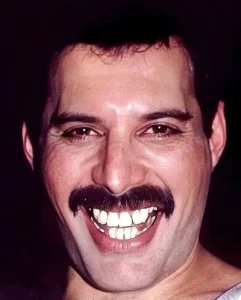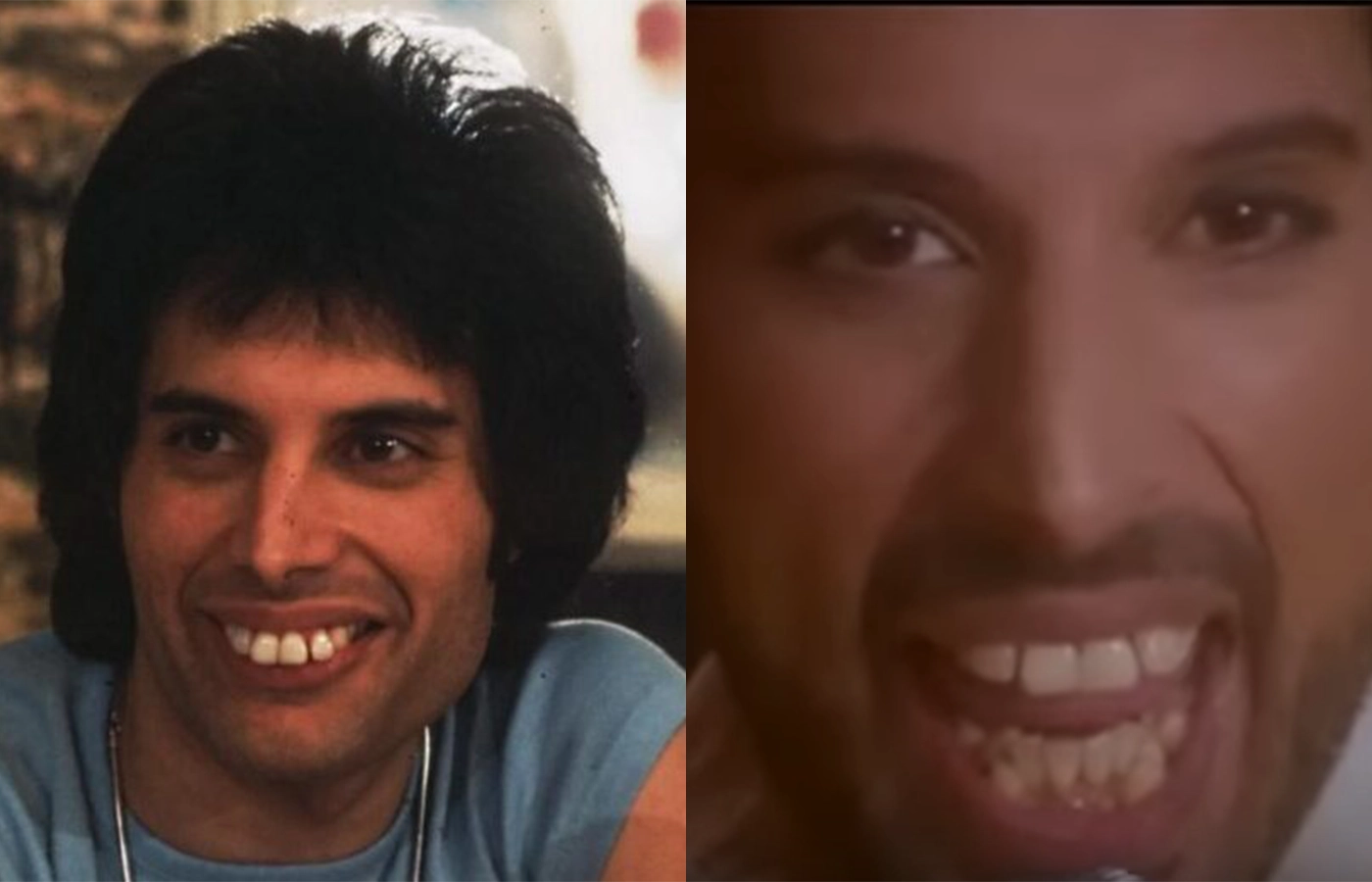Freddie Mercury, the legendary frontman of Queen, is celebrated for his exceptional vocal abilities and captivating stage persona, as well as his unique teeth features. His prominent incisors and noticeable overbite became a defining aspect of his appearance, generating interest and discussion among fans.
The Truth Behind Freddie Mercury’s Teeth
Contrary to popular belief, Mercury’s dental condition was not simply a case of crooked teeth. Freddie Mercury suffered from a rare condition called hyperdontia, characterized by the presence of more teeth than usual. In his case, he had four extra teeth in his upper arch, which pushed forward his front teeth creating his signature overbite.
Although some may have viewed this as a cosmetic imperfection, Mercury embraced it and transformed it into a distinctive aspect of his identity. His self-assurance and charm made his smile truly memorable, showcasing the idea that genuine beauty is found in one’s individuality and genuineness.
Myths About Freddie Mercury’s Teeth and Voice

Freddie Mercury’s teeth have captivated and intrigued many, leading to various myths linking them to his exceptional vocal talents. Let’s delve into some of these misconceptions and distinguish truth from falsehood:
Extra Teeth Enhanced His Vocal Range
Some claim that the extra teeth gave Freddie Mercury a larger oral cavity, enhancing his vocal range. Although the concept is interesting, it lacks scientific evidence to support it. Mercury possessed an extraordinary vocal range that spanned four octaves, showcasing his exceptional control over his false vocal cords and innate talent. His exceptional vocal abilities and innate talent enabled him to skillfully manipulate his voice, resulting in a distinct vibrato and an impressive vocal range.
Although the size of one’s oral cavity can affect how sounds are produced, there is no indication that Mercury’s dental health had a notable impact on his vocal talents. The distinctiveness of his voice can be attributed to the inherent anatomical characteristics of his jaw and larynx, combined with his exceptional vocal technique and precise control.
Freddie Mercury’s remarkable vocal range continues to captivate rock enthusiasts, although the idea that his dental structure played a significant role in it is more of a misconception than reality. His exceptional talent was a result of a unique combination of natural abilities and unwavering dedication to honing his craft, which earned him a legendary status in the world of vocal performance, regardless of any physical attributes.
The Emotional Weight of Freddie Mercury’s Teeth
Despite his charismatic stage presence and undeniable talent, his teeth were a constant reminder of the teasing he endured during childhood and the bullying he experienced.
Growing up, Freddie was often ridiculed by his peers who cruelly nicknamed him “Buck Bunny” due to his pronounced overbite. This bullying had a lasting impact on his self-esteem. Mercury often attempted to hide his teeth, covering his mouth with his hand or strategically positioning the microphone during performances. Despite his immense personality, this small but significant part of his appearance was a vulnerability he never fully overcame.
However, Mercury’s teeth also became a symbol of his resilience and individuality. Instead of succumbing to societal pressures to conform to conventional beauty standards, he embraced his unique appearance. It’s almost poetic that the very feature that had caused him so much pain as a child became an integral part of his iconic image as a rock legend.
The Reasons Behind Freddie Mercury’s Decision
Why did Freddie Mercury not opt for dental correction, despite being a celebrity with the resources to do so? The motivations are complex and revealing.
Firstly, Freddie was deeply convinced that his teeth contributed significantly to his extraordinary vocal range. He believed that the extra teeth provided him with additional space in his mouth, allowing him to reach higher notes with greater ease. While this theory is not supported by concrete scientific evidence, his conviction was strong enough to dissuade him from any corrective treatment.
Secondly, Freddie Mercury was an artist who embraced his individuality. His teeth had become a distinctive trait of his image, contributing to his eccentric and charismatic persona. Correcting his teeth would have meant losing a key element of his identity, an aspect that made him unique and recognizable.
Finally, there’s the issue of insecurity and the bullying he experienced during childhood due to his teeth. Despite his success and fame, the emotional scars caused by these experiences might have influenced his decision to keep his smile just the way it was.
In conclusion, Freddie Mercury’s choice not to correct his teeth was a combination of factors, including the belief that they positively impacted his voice, the desire to retain his individuality, and the emotional weight of past experiences. His decision is an example of how self-perception can influence aesthetic choices and how self-acceptance is crucial for building a strong identity.
Freddie Mercury’s teeth story is a powerful reminder that beauty is not defined by standards of perfection but by the ability to embrace one’s uniqueness.
EXCELLENTBased on 119 reviews Posted on
Posted on
 Angelique Van Luchene2025-09-30Wij bezochten Dental clinic (Class Dent) per toeval. We werden opgehaald aan de luchthaven. We werden hartelijk omhaalt door Kevin. Super gast! We werden door Kevin meteen geïntroduceerd in de wereld van Albanië en wat er om leeft. Dit stelde ons meteen gerust.We werden eerst geconfronteerd met ons verblijf. Het appartement waar we verbleven was heel proper. Kort erna werden we verwacht in de kliniek, heel proper, de laatste nieuwe apparatuur en hier hartelijk onthaald geweest. We hebben hier ook de eerste richtlijn gehad wat er ons te wachten stond. De dag erna werden alle tanden getrokken die moesten verwijderd worden. Een hele goeie opvolging van Kevin die mij constant op de hoogte houd van wat er was gebeurd met mijn man. Elke dag stonden er een of meerdere consultaties op de agenda voor de opvolging. De hygiëne is er op en top ! Drie dagen na de operatie werden de voorlopig tanden geplaatst, zoals beloofd. Wij zijn de dag erna teruggevlogen naar België en we wachten nog 3-4 maanden af om terug te komen zodat de uiteindelijke implantaten kunnen geplaatst worden. Wij zijn alvast heel enthousiast over het gebeuren en de werking van de kliniek .Wij zien elkaar terug en februari of maart 2026 voor de definitieve tanden. Kevin, en de rest van de tandartsen…jullie zijn toppers ! Jullie toveren een lach op iemands gezicht die al heel lang niet meer kon lachen. Vele groeten Diederik en AngeliquePosted on
Angelique Van Luchene2025-09-30Wij bezochten Dental clinic (Class Dent) per toeval. We werden opgehaald aan de luchthaven. We werden hartelijk omhaalt door Kevin. Super gast! We werden door Kevin meteen geïntroduceerd in de wereld van Albanië en wat er om leeft. Dit stelde ons meteen gerust.We werden eerst geconfronteerd met ons verblijf. Het appartement waar we verbleven was heel proper. Kort erna werden we verwacht in de kliniek, heel proper, de laatste nieuwe apparatuur en hier hartelijk onthaald geweest. We hebben hier ook de eerste richtlijn gehad wat er ons te wachten stond. De dag erna werden alle tanden getrokken die moesten verwijderd worden. Een hele goeie opvolging van Kevin die mij constant op de hoogte houd van wat er was gebeurd met mijn man. Elke dag stonden er een of meerdere consultaties op de agenda voor de opvolging. De hygiëne is er op en top ! Drie dagen na de operatie werden de voorlopig tanden geplaatst, zoals beloofd. Wij zijn de dag erna teruggevlogen naar België en we wachten nog 3-4 maanden af om terug te komen zodat de uiteindelijke implantaten kunnen geplaatst worden. Wij zijn alvast heel enthousiast over het gebeuren en de werking van de kliniek .Wij zien elkaar terug en februari of maart 2026 voor de definitieve tanden. Kevin, en de rest van de tandartsen…jullie zijn toppers ! Jullie toveren een lach op iemands gezicht die al heel lang niet meer kon lachen. Vele groeten Diederik en AngeliquePosted on
 Nicola Buono2025-09-20Sono degli angeli professionali, gentili e abbastanza onestiPosted on
Nicola Buono2025-09-20Sono degli angeli professionali, gentili e abbastanza onestiPosted on
 Malgorzata Skala2025-08-29During my holiday, I ended up at this clinic completely by chance – I broke a tooth and needed urgent help. I was pleasantly surprised by how quickly and professionally I was treated. From the very beginning, the staff were extremely kind, friendly, and caring, and the doctor explained every step of the treatment in detail. Despite the stressful situation, I felt very well taken care of. The procedure was carried out efficiently and painlessly, and the result exceeded my expectations. The atmosphere in the clinic is welcoming and modern, and it is clear that the people working there are passionate and highly experienced. I am grateful that I came across this place – they saved my holiday and restored the comfort of my smile. I can wholeheartedly recommend it to anyone looking for professionalism combined with a truly human approach.Posted on
Malgorzata Skala2025-08-29During my holiday, I ended up at this clinic completely by chance – I broke a tooth and needed urgent help. I was pleasantly surprised by how quickly and professionally I was treated. From the very beginning, the staff were extremely kind, friendly, and caring, and the doctor explained every step of the treatment in detail. Despite the stressful situation, I felt very well taken care of. The procedure was carried out efficiently and painlessly, and the result exceeded my expectations. The atmosphere in the clinic is welcoming and modern, and it is clear that the people working there are passionate and highly experienced. I am grateful that I came across this place – they saved my holiday and restored the comfort of my smile. I can wholeheartedly recommend it to anyone looking for professionalism combined with a truly human approach.Posted on
 Ardjana Himalli2025-08-25Mi sono trovata davvero molto bene presso questo studio dentistico. Ho apprezzato fin da subito la grande professionalità di tutto lo staff, unita a una gentilezza che mette subito a proprio agio. L’ambiente è accogliente, curato e soprattutto estremamente pulito, cosa che trasmette un senso di sicurezza e attenzione ai dettagli. Durante le visite mi sono sempre sentita ascoltata e seguita con competenza. Consiglio vivamente a chi cerca un dentista serio, preparato e umano.Posted on
Ardjana Himalli2025-08-25Mi sono trovata davvero molto bene presso questo studio dentistico. Ho apprezzato fin da subito la grande professionalità di tutto lo staff, unita a una gentilezza che mette subito a proprio agio. L’ambiente è accogliente, curato e soprattutto estremamente pulito, cosa che trasmette un senso di sicurezza e attenzione ai dettagli. Durante le visite mi sono sempre sentita ascoltata e seguita con competenza. Consiglio vivamente a chi cerca un dentista serio, preparato e umano.Posted on
 kyle orten2025-08-09Excellent care and customer service.Posted on
kyle orten2025-08-09Excellent care and customer service.Posted on
 Ferdows Rasooli2025-07-25I did implant in hier with my wife and the surgery was gone very good, Was the best experience at this clinic, respectful stuff and respectful Doctor, thank youPosted on
Ferdows Rasooli2025-07-25I did implant in hier with my wife and the surgery was gone very good, Was the best experience at this clinic, respectful stuff and respectful Doctor, thank youPosted on
 Oliver Memo2025-07-17La migliore esperienza dentale che io abbia mai avuto. Sono stati molto gentili, specialmente il dottor Marius, il mio dentista preferito.Posted on
Oliver Memo2025-07-17La migliore esperienza dentale che io abbia mai avuto. Sono stati molto gentili, specialmente il dottor Marius, il mio dentista preferito.Posted on
 David Jonsson2025-07-09Exceptional Dental Experience in Durrës, Albania From the very beginning, the service at ClassDent Clinic (Lagja 1, Rruga Taluantia, 2001, Durrës, Albania) was world-class. The clinic’s team handled everything with professionalism, care, and great efficiency, making the entire experience smooth and stress-free. What truly stood out were four key things: 1. Outstanding service from the first contact to the final appointment. 2. Excellent communication—clear, responsive, and reassuring throughout. 3. A highly skilled and kind dental team, who made me feel comfortable and well taken care of. 4. Very reasonable prices, especially considering the top-tier quality of care provided. If you’re considering dental work abroad, I can wholeheartedly recommend ClassDent Clinic in Durrës. Their commitment to patient care, modern equipment, and professional approach truly set them apart. A first-class experience from start to finish.Posted on
David Jonsson2025-07-09Exceptional Dental Experience in Durrës, Albania From the very beginning, the service at ClassDent Clinic (Lagja 1, Rruga Taluantia, 2001, Durrës, Albania) was world-class. The clinic’s team handled everything with professionalism, care, and great efficiency, making the entire experience smooth and stress-free. What truly stood out were four key things: 1. Outstanding service from the first contact to the final appointment. 2. Excellent communication—clear, responsive, and reassuring throughout. 3. A highly skilled and kind dental team, who made me feel comfortable and well taken care of. 4. Very reasonable prices, especially considering the top-tier quality of care provided. If you’re considering dental work abroad, I can wholeheartedly recommend ClassDent Clinic in Durrës. Their commitment to patient care, modern equipment, and professional approach truly set them apart. A first-class experience from start to finish.Posted on
 j——- D-man2025-07-02In februari en juni geweest en niets anders dan lof voor hun kunde en professionele aanpak. Je gaat pas naar huis als alles perfect is. Nog maals dank voor mijn perfecte glimlach en 5 sterren is veel te weinig. Dus voor jullie ⭐️⭐️⭐️⭐️⭐️⭐️⭐️⭐️⭐️⭐️
j——- D-man2025-07-02In februari en juni geweest en niets anders dan lof voor hun kunde en professionele aanpak. Je gaat pas naar huis als alles perfect is. Nog maals dank voor mijn perfecte glimlach en 5 sterren is veel te weinig. Dus voor jullie ⭐️⭐️⭐️⭐️⭐️⭐️⭐️⭐️⭐️⭐️







